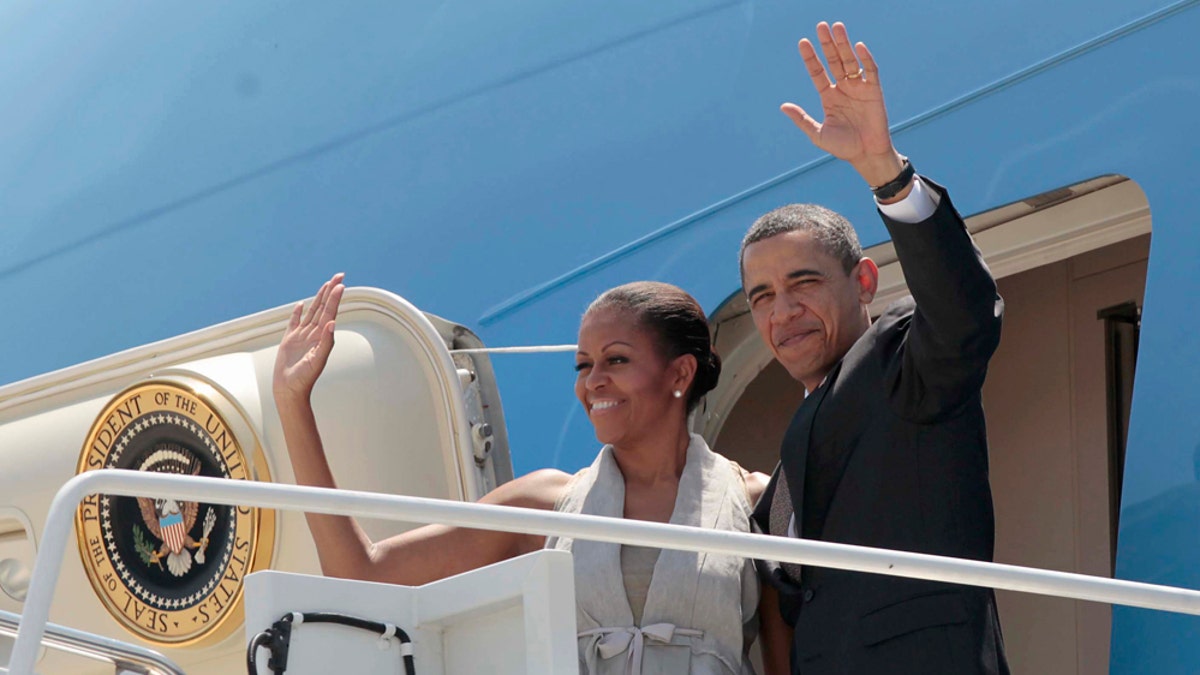
President Barack Obama and first lady Michelle Obama wave prior to boarding Air Force prior to departing San Salvador, El Salvador, Wednesday, March 23, 2011. (AP Photo/Pablo Martinez Monsivais) (AP2011)
President Barack Obama's visit to Latin America symbolically illustrated the new politics of the hemisphere — a move from handouts to collaboration, from political irrelevance to a growing global footprint, and a perspective that will not always hew to the wishes of its giant neighbor to the north.
The visits to Brazil, Chile and El Salvador projected a new, softer image of U.S. regional influence based on common bonds. "We are all Americans," Obama declared. He leaves behind nations delighted by the attention but determined to use their growing economic voice their own way.
A day after Obama left Brazil and two days after NATO allies began enforcing a U.S.-backed no-fly zone over Libya, the government of President Dilma Rousseff called for a cease-fire.
Chilean President Sebastian Piñera pressed Obama to complete pending trade deals with Panama and Colombia. And in an interview with The Associated Press the day after Obama's departure from the Chilean capital, Piñera said he would request U.S. intelligence documents related to human rights violations during the Pinochet dictatorship — an uncomfortable chapter for the United States because it backed his regime.
American financial aid does not carry as much influence as it once may have — though fiscal pressures on the U.S. make that aid unlikely anyway. The strongest leverage the United States has is forging relationships based on mutual commercial or security interests. But Obama knows Latin America has heard pledges for new regional alliances before, only to see them fizzle.
"Words are easy, and I know that there have been times where perhaps the United States took this region for granted," Obama said in Santiago.
Indeed, many in Latin America thought his trip was long overdue. But Obama leaves behind good will in his host countries and leaders buoyed by a sense that his visit brought them and their countries a degree of international validation.
By that measure, the trip ends on a successful note. Obama went to the region with little anticipation of signing grand agreements or achieving bilateral breakthroughs.
"What President Obama proposed to us yesterday was something Chile has been assuming for a long time now -- a different relationship, to move from handouts to collaboration, from an unequal vertical relationship to a relationship of equals, horizontal," Piñera said in his interview with The Associated Press on Tuesday.
For Obama, the timing of the trip awkwardly coincided with American forces dropping bombs and firing missiles at Libya. Questions about Libya dogged Obama at every stop.
The White House maintains that simply showing up can do much to build bridges. Obama generally stuck to his itinerary despite the demands of the attack on Libya, helping mitigate any lingering irritation that he had put off the visit for too long.
It's an approach the White House under new political adviser David Plouffe has employed domestically as well, sending Obama on weekly visits to states to make his case on domestic topics even as national and international issues overwhelm them.
A good relationship abroad, deputy national security adviser Ben Rhodes said, will yield benefits for the United States over time.
"For instance," he said, "Brazil is one of the largest economies in the world, and an emerging global power, and trips like this are indispensable to elevate relations to a new level."
A trip such as this can also generate domestic rewards. El Salvador has one of Central America's highest rates of emigration, especially to the United States. As Obama said Tuesday night in a toast to President Mauricio Funes, "Just about every Salvadoran has a loved one or a friend in the United States -- husbands and sons, mothers and daughters — working hard, sacrificing every day."
In regions such as northern Virginia, with a heavy concentration of Salvadorans, such attention can reap political benefits.
The power of trips like these also rests on the lingering symbolic images.
Obama supplied them. He played soccer with children in a Rio de Janeiro shantytown, visited the tomb of slain Roman Catholic Archbishop Oscar Arnulfo Romero in San Salvador, and addressed the people of Latin America from La Moneda, the Chilean governmental palace placed under siege during a bloody coup nearly four decades ago and now the heart of a restored democracy.
Taken together, the pictures illustrate the strides Latin America has taken and how remarkably different it is from the strife that characterized it in the 1970s and 1980s.
Brazil has grown into the seventh largest economy in the world. Chile has emerged from Augusto Pinochet's dictatorship with a vibrant democracy and a succession of center-left but pragmatic leaders -- a string only broken by Piñera, a Harvard educated conservative who nonetheless has not sought to dismantle the work of his predecessors.
El Salvador, still struggling economically, has established its own model of democracy after the bloody 12-year civil war that began in 1980s and left an estimated 75,000 people dead. After years of democratically elected conservative governments, Funes was elected as the candidate of the party of former left-wing guerrillas.
Obama's trip also revisited complicated periods of the United States' own history, when it sided with often brutal right wing factions, particularly in Chile and El Salvador. Asked by a Chilean reporter Monday whether the United States was prepared to seek forgiveness for any role it played in the 1973 coup of Socialist President Salvador Allende and the subsequent repression in Chile, Obama sought to look ahead instead.
"It's important for us to learn from our history, to understand our history, but not be trapped by it," Obama said. "We have challenges in the future that we have to attend to."
Based on reporting by Jim Kuhnhenn of the Associated Press.
Follow us on twitter.com/foxnewslatino
Like us at facebook.com/foxnewslatino
